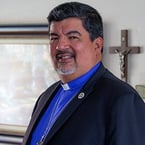Faith is something Christians hold onto tightly. It is part of what makes us who we are, and it is a gift from God that makes our daily lives matter. Through our faith in Him, we are able to live a life that stands out no matter what culture we are born into. Read an excerpt about a Christian’s holy vocations within the culture from Faith That Sees through the Culture written by Alfonso Espinosa.
The Christian in Holy Vocation
With this holiness of the culture in place—in spite of its terrible inconsistencies—we may take the next step and understand that the vocations, or callings, within the culture are also holy. Such a view changes everything. Luther said, “Every occupation has its own honor before God, as well as its own requirements and duties” (Luther’s Works, vol. 46, 246). Too often people do not see this. Once again, we are taken back to the things seen and unseen. People don’t get God’s way. God views all vocations as holy, because they come from Him. Luther again: “All the estates and works of God are to be praised as highly as they can be, and none despised in favor of another” (Luther’s Works, vol. 46, 246).
This is not just a theological factoid. If this truth of God is believed, then everything in our attitude about vocation should change. These are not just jobs or roles, but they are callings from God, holy things, and ways to serve God and neighbor. As God worked through Cyrus to help Israel, God works through people in holy vocation so that others may benefit and be served. God is the one working through holy vocation, so every vocation becomes extraordinarily important.
Many Christians are influenced by a false spirituality that they must somehow be “more Christian” in their vocation by maintaining a higher standard of the law, by using Christian phrases, or by being more overt in appearing religious or spiritual. Certainly, we can never pray too much, nor should we forget to look for chances to witness more openly when the opportunity presents itself. Along the way, however, it is easy to forget what God has already done to help us live in our faith in a way that does not call for extraordinary feats, but rather through the simple lens that sees vocations as holy.
Giving Glory to God in our Daily Lives
Since God has made being an administrative assistant holy, then one should aspire to be the best admin he or she can be. As God has made being a security guard holy, then being faithful as a security guard gives glory to God. Christian attorneys ought to be invigorated to know that God works through them to help others. Christian doctors may rejoice that they’re extensions of the healing hands of God. Christian teachers faithful to their calling impart knowledge to equip people, helping lives. This is God’s work. Christian artists should desire to glorify the Maker of all things, even as their work may testify to the Creator Himself. Knowing that being a mother or father is holy, then we should be confident that God is with us to glorify Him as we strive to be the best parent possible. Christian grandparents should resolve to be a blessing for their grandchildren, knowing fully that God works through them in a vocation that is completely unique. When Christians make it their goal to be the best students, athletes, workers, or citizens they can be—whatever they are—then they will live with eyes of faith on God: “And whatever you do, in word or deed, do everything in the name of the Lord Jesus, giving thanks to God the Father through Him” (Colossians 3:17).
If we indeed achieve a standard of excellence in what we are called to do, then we earn the respect of those around us. Excellence in vocation gives a person a voice. Here, we become cognizant of another duality important to remember: while our relationship with God does not depend on what we do but rather depends on faith, our relationship with people very much depends on what we do. Through faith, we are justified by God. Through works, we are justified by people. God looks at the heart; people look at our works. If our conduct and work are outstanding, we are often granted a platform, we earn respect, we gain an audience; people are more apt to want to know us, and they will be more apt to care about what we say. People who have good reputations are permitted a leeway that those without good reputations never know. An outstanding reputation earns an air of authority or at least respectability that can open doors. If this is what we achieve through faithfulness and hard work in vocation, then it will be ten times easier to be a witness for Jesus Christ.
Post adapted from Faith That Sees through the Culture, copyright © 2018 Alfonso O. Espinosa. Published by Concordia Publishing House. All rights reserved.
Order Faith That Sees through the Culture to learn how you can embrace your God-given vocations.














